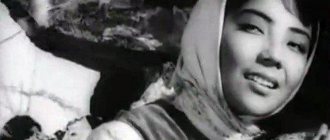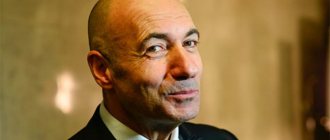Vocal range is the number of notes a vocalist can sing.
From the lowest note to the highest. More precisely, how much vocal cords can stretch to close at the top and bottom.
During
a trial vocal lesson,
the teacher
first of all evaluates your singing range when he gives you a description of your voice.
Having a wide vocal range is important for a good performer. Why know
what voice range you have and why to develop it, as well as who has the largest voice range among modern singers - read below!
What is your voice and range?
Professional singing, like big-time sports, doesn’t take just anyone. The future singer must have good vocal physiology . The elasticity of the vocal cords given by nature. It is this that influences the flexibility of the voice and the breadth of the range.
However, your singing range can be developed! To do this, you need to know what your vocal range is.
In academic singing there is a generally accepted system with clear boundaries of the singing range. Which is already more than 300 years old, just a minute!
She divides female and male voices into low and high. And then it forms a range according to the number of notes that they can cover.
| Voice type | FEMALE | MALE |
| HIGH |
|
|
| AVERAGE | mezzo-soprano | baritone |
| SHORT | contralto (alto) | bass |
In pop and jazz singing, any classification of voice by range has been abandoned. Because in modern pop, rock and soul music there are no boundaries or canons, like in the classics.
For example, in opera, a certain type (range) of voice is assigned to the timbre and character of the character.
- The lyric soprano most often sings "prima", the main character suffering from love.
- The tenor is her dreamy lover.
- The baritone or bass is the villain who wants to separate them.
- The mezzo-soprano is an antagonist, a rival of the “prima”, always with a dramatic fate.
- Coloratura is often given to mythical characters, just remember the aria of the Queen of the Night by Mozart.
Approximate boundaries of singing ranges in academic vocals: Knowing the character of the character and his voice coloring, the composer composes operatic arias that are suitable in height for a singer with a certain singing range.
In modern pop and jazz vocals, the range does not always correspond to the music you sing. You can change the timbre and character of the sound, no matter what your range is. And also have a singing range of four octaves, but perform pop songs with three notes.
Show business and music news NEWSmuz.com
Indeed, persuading a diva for an interview is a great success. Alla Borisovna did not agree for a long time, citing the refusal by the fact that there was no informational reason. Finally, such a reason was found. On December 9, at the Olimpiysky Sports Complex, she will rule the roost at the updated “Song of the Year.” For this celebration of music, Pugacheva came up with a new concept.
Before turning on the recorder, AiF gave the Diva a book by one of the super fashionable French writers.
- Thank you. By the way, lately I’ve been reading books only based on recommendations. I recently finished “The Sheep Hunt” by Haruki Murakami. This novel reminded me so much of the times of my youth, when I was drawn to mysticism and philosophy. I understand what Murakami wanted to say, or, for example, Coelho, who wrote The Alchemist, or the author of the novel Jonathan Livingston Seagull. This literature is for young people who are just beginning to analyze, delve into themselves and in life. Sometimes I turn to this literature to feel myself in my starting positions.
—Aren’t you tormented by doubts that your generation read the wrong books, listened to the wrong music, and watched the wrong films in childhood?
- We just read those books. It’s a shame that today’s younger generation doesn’t read TECH. On the one hand, they make their life, perhaps, more frivolous, because they do not know anything, for example, about war. But I am aware that these 12- or 13-year-old children will not understand the essence of that terrible tragedy. And it is not necessary. Let's be happy for them. Let them live a different life, listen to more frivolous music, read more frivolous books. Thinking easily is not such a bad thing.
"Opera is not my art"
— Yes, and pop is considered a more frivolous genre compared to opera.
Is this fair in your opinion? — Of course, I am fascinated by the ease with which, for example, Domingo, Carreras or Pavarotti strike complex notes. I bow to such voices. But we on the stage are still somewhat artificial. What can I say - both Bernes had no voice at all, and Utyosov, but they took him by the soul. And opera singing, it seems to me, is more a demonstration of natural vocal abilities. And opera singers sing the same thing all the time. And we cannot afford this.
— You never tried your hand at opera. Does your voice range not allow it or is this a fundamental decision?
— When I sang the aria from “Khovanshchina” “The youngest went all the meadows and swamps,” many opera singers said admiringly: “Oh, yes!” But you're right - this is fundamentally not my art. In the pop genre you can sing in any voice, but in opera you can only sing in a good and well-produced voice. This limitation does not suit me. Although I feel that I already need a different language for communicating with people.
- What do you have in mind?
“I set myself the task that I would sing only until I was sixty years old.”
— Why exactly up to 60?
- Enough…
— What if the creative itch won’t give you rest even after 60?
— The itching can be relieved with something else ( laughs)
). Both in cinema and in the theater. But I can finish pop singing tomorrow, and in a month, and in a year. But until I reach 60 maximum, I’ll stop doing this. Because I don’t want to, I just DON’T WANT to show myself in this anymore. I have already proven to myself and others that I can do anything in the pop genre.
— Isn’t it a little difficult to move into another area of art with such baggage? Here, before our interview, you scolded the television people and said that you were not telegenic.
“I just don’t like television, which I have to go hand in hand with all my life.” I’m cinematic, yes, but not telegenic. Damn, every time you sit there looking beautiful, wonderful, then you look at what comes out of the shooting and think: “Well, what is this?!” In my case, a lot depends on the light. And then these questions: “Tell me...” What will I tell you?
— Reveal the secret: how and where you will put the bold point
- Who cares? Who said that this needs to be done in Moscow or St. Petersburg? You can, of course, come up with something, but I think I’ll leave in English... Everyone will understand that I left. Or I can say “thank you” from the screen. But I don’t have to do a farewell concert and kiss the stage! Nothing like this. I will not leave with tears, but joyfully and cheerfully. And I’m not at all going to die on stage ( laughs
).
“Song of the Year” - to the masses
— BUT UNTIL you leave, the audience has the opportunity to see you in “Song of the Year,” for which you came up with a new concept.
“I want it to turn into a people’s program.” Since I’m not doing “Christmas Meetings” right now, I want to add an element of some kind of show to “Song of the Year,” and not just come out and announce: “Here’s the best song for you.”
— Will you start from the artists or from the songs?
- From songs.
— Is it already difficult to surprise you with something or are there such artists?
- Why is it difficult? For example, Kostya Meladze surprises me every time. A talented man, not to mention his brother Valera. Tina Karol and Dima Bilan are encouraging, by the way, they first announced themselves at the “New Wave” in Jurmala. I am also pleased with my own daughter Christina, who, perhaps, does not sing any folk hits, but makes very high-quality pop music. I also like completely debutants, such as Yolka. Last year she opened, and this year she has another good song. I can’t help but invite Okean Elzy, because I adore this group.
Unfortunately, due to the tense relationship between Channel One and Igor Krutoy, I can’t invite many artists.
Although I think that songs from Channel One should be delegated to the “Song of the Year” (from programs such as “New Songs about the Main Thing”, “Golden Gramophone”), from “Russian Radio”, from MTV, etc. Then these strife will be forgotten. We will try to collect the most objective information from radio stations using SMS voting and questionnaires published in your “Arguments and Facts”.
— What if the people’s choice does not coincide with yours?
“I may not like a piece, but if there is a demand for it, it will definitely end up in the “Song of the Year.” People understand everything well and give advice; you can’t fool them.
— But often radio stations and television channels simply impose this or that artist, actively promoting him on their air.
“I’m an experienced person and I can understand which song was imposed and which is really worthy. Here I will put my hand in and turn on my professional instincts.
How to determine your vocal range?
A vocal teacher will be able to find out your voice range and select songs that suit your pitch . However, you can do it yourself. Determine using a tuner , or with an instrument, if you know the notes.
Sing the chants until you can close your vocal cords and make at least some sound. The highest and lowest notes you can produce will be the limits of your overall vocal range.
Here's a little scale to give you an idea of what we're talking about:
- 1-1.5 octaves is the working range of the average beginning vocalist who has not yet developed a voice.
- 2-2.5 octaves is a singing range with which you can take complex, beautiful songs. Many people with naturally flexible voices have a range of two octaves without vocal training.
- 2.5-3 octaves is the range of a professional singer. By the way, singers who work in musicals and sing in opera are required to have a range of at least two octaves!
- 3-3.5 and above is the range of a GOOD professional singer.
- 4-4.5 octaves are rare among vocalists. However, all singers strive for the four-octave mark, and by hook or by crook they add a couple of notes to themselves in words.
- 5 octaves and higher are very rare; the voices of such people are considered unique and are often included in the Guinness Book of Records.
WHAT HAPPENED TO PUGACHEVA'S VOICE?
The prima donna has lost her main wealth
This incredible loss was witnessed by millions of spectators who watched Raymond Pauls' concert on television. Alla Borisovna sang the hit “Antique Clock,” beloved by many. And a minute later a prima donna appeared on the screen with the same song, only twenty years ago. Everyone was shocked. The melody and words are the same, Pugacheva, despite the changes that have occurred to her, is also recognizable. But the voice! The voice was completely different! Clean, sonorous, bewitching... Against this background, the current vocals of the prima donna seemed hoarse, rough, vulgar, and not vocal at all. So what happened to Pugacheva’s voice? In 1965, the naive song “Robot” was heard on the radio in the “Good Morning” program. Alla Pugacheva sang it. Now she is “The Woman Who Sings”, a prima donna and so on and so forth. And then she was a 16-year-old student at the Moscow School. Ippolitova-Ivanov. A clear, memorable voice. She didn’t just sing “Robot-robot, become human,” but played the role of a girl in love with a robot. It was clear that she had come seriously and for a long time. But no one expected it to be so bad. Her extraordinary acting skills helped her experience every song. Hearing the sadness in her voice, which changed from deep velvet to a scattering of ringing sparkles in the song “Harlequin”. But completely different songs made Pugacheva a star, a prima donna - “A Million Scarlet Roses”, “Maestro”, “Antique Clock” and “Without Me” - the result of collaboration with Raymond Pauls, Ilya Eznik and Andrei Voznesensky. There are statistics according to which in 1986 alone, Alla Pugacheva gave 119 concerts, that is, almost every two days. Accumulated fatigue manifested itself in the early 90s. On the recording of the poignant 1992 song “Autumn Kiss,” her voice sounded tired. Along with the singer’s weakened voice, her repertoire is changing towards, perhaps, Russian chanson and urban romance. Remember The Real Colonel, Mary? Fans, seeing their favorite in the video with Garik Sukachev “Little by little,” did not recognize the singer. And in the song “Happiness” from the 1997 album, the prima donna’s voice is already cracked, with the hoarseness of an old smoker. At first we were scared. And then we got used to it and now we take for granted both “The Young Girl” and “Madame Broshkina”, and even the latest masterpieces like “My stupid head - legless, armless.” There is no trace left of serious love lyrics like “Insomnia” or “Autumn Kiss,” not to mention the hits of the early 80s. But why, for example, is Pugacheva’s eternal rival, Sofia Rotaru, still singing beautifully live, in her old voice, and why did people leave Pugacheva’s last concerts confident that she sang one or two songs without plywood?
Disease history
Experts agree on one thing - Alla Borisovna paid with her vote for her wild and unhealthy lifestyle. The prima donna, by her own admission, has been smoking since she was thirteen. She started drinking alcohol a little later, as a student at the conducting and choir school, in 1964. They hid in the basement, smoked, drank wine - the usual student pastimes. They say that the more the prima donna asserted her stardom, the more noisy parties she organized. However, Alla Borisovna really became addicted to alcohol in the late 80s - early 90s. Actually, Pugacheva’s problems with her voice began around the same time. People who worked with her at that time tell how Alla Borisovna loved to breastfeed before a concert. Makeup artists had to work hard to cover up her swollen face and burst blood vessels. Alla Borisovna’s favorite “doping” was cognac. At first she drank Armenian and Moldavian. Then I switched to the expensive Hennessy. According to rumors, Alla Borisovna also respects tequila and red wine. Journalist Alexey Sumin, who at one time worked as the prima donna’s press secretary, says that the norm for her was three glasses. It doesn’t matter what - wine, vodka, cognac. However, quite often she deviated from this norm. And Alla Borisovna smokes almost every five minutes. She has five reasons for this... Alla Borisovna’s acquaintances say that she, like many others, relieves stress with smoking and alcohol. She has plenty of them. 1. Men. Circus performer Mikolas Orbakas, head of the VIA "Jolly Fellows" Pavel Slobodkin, film director Alexander Stefanovich, director of the singer Evgeny Boldin, Vladimir Kuzmin, Sergei Chelobanov, Philip Kirkorov... And this is perhaps an incomplete list of her passions. At the same time, all the meetings and partings of the prima donna with her husbands and lovers were marked by drunken sprees. They say how Pugacheva once took a lot of it on her chest in Dnepropetrovsk, accompanying the libations with toasts that after this city she was wary of love. It turned out that Vladimir Kuzmin once lived in Dnepropetrovsk. 2. Family. They say that even now Alla Borisovna is also uneasy on the family front. People close to the prima donna say that her marriage with Kirkorov became obsolete several years ago and she is very worried about this. 3. Illness. In 1992, Alla Borisovna almost died after unsuccessful plastic surgery. Before this, she had not drank for three years and had not smoked for six months. But after such stress I broke down again. 4. Fatigue. Alla Borisovna has said more than once that she is tired of her popularity, loneliness, and tired of being in the public eye all the time. 5. Joy. Positive stress, as you know, is also stress. It is enough to remember how noisily Pugacheva celebrated the birth of her second grandson. According to eyewitnesses, after several days of partying with the musicians, she was dying of a hangover.
Drunk tales (about the adventures of a prima donna):
The first story, from the car factory. Once, during a time of terrible shortage, Pugacheva went on tour to Tolyatti. Her friends asked her to buy three cars without waiting in line. To come to an agreement with the local leadership, she had to sit with them over a bottle of vodka. After this, Alla Borisovna went to Rostov to continue the tour. And as luck would have it, the concert was during the day. And the prima donna did not have time to sleep. She then performed wearing dark glasses, holding onto the counter and having difficulty remembering the words. And then she set a rule: before the concert, no, no. True, exceptions to it were made quite often. The second story, the presidential one. It happened at the farewell match of hockey player Vyacheslav Fetisov at the Olimpiysky. The prima donna arrived heavily drunk, staggering and cursing on all sides. - Don’t swear, Alla Borisovna, it’s a holiday! — the policeman remarked good-naturedly. - What a f... holiday! — the prima donna was indignant and moved straight to the presidential box. However, the young guard pulled Alla Borisovna away from the door: “You can’t come here.” - Who are you anyway?! - she roared. - I'm a star! Are you fucking blind, didn’t you recognize it, or what? Who are you here? “I’m Lieutenant of the Federal Presidential Security Service Denis Sevastyanov,” the guy introduced himself. - F... and I’m your guard, along with your president and you! - With these words, the prima donna grabbed the guard by the tie, began to choke him and push him away from the door. In the end, the security guards who came running managed to escort the prima donna into the hall. And this incident became the talk of the town. The third story is grassy. However, some people close to the prima donna claim that conversations about her binges arose out of nowhere. It’s just that in the early 80s (namely, since then they started talking about Pugacheva’s addiction to smoking) doctors prescribed Alla Borisovna herbal decoctions of a specific amber-cognac color. She carried them in flat cognac bottles - the most convenient container at that time. And so Pugacheva sang before the concert and from time to time sipped the broth from the bottle. And everyone around was whispering: “Wow, this woman is killing herself!”
Expert comments:
Igor GORBATOV, narcologist: “I don’t want to say anything bad about Alla Borisovna, but, alas, she exhibits, if not all, then many of the symptoms of alcohol addiction. For example, alcohol has a destructive effect on the vocal cords. Alla Borisovna developed hoarseness about ten years ago. At first it was light, barely noticeable. Then the voice deepened significantly. A woman who drinks, as a rule, does not take care of herself. This is noticeable in Alla Pugacheva. Alla PUGACHEVA about alcohol: — I treat alcohol with care. All the best things that I have written, all the crazy ideas - this was carried out, let’s say, not without the influence of alcohol. However, troubles also happened precisely because of this. It is very important for a woman of a certain age to find the strength to stop smoking and drinking. If it weren’t for my illness, which almost took me to the grave, I still might not have drank or smoked... It was very difficult for me to quit. In the first months, all sorts of nasty things poured out on my face, I was like King Kong. Then it all went away. My face turned pink like a petal. I saw all the colors in a different color. And I'll quit again to feel it. A word for defense: To shed light on the mysterious disappearance of Alla Borisovna’s voice, we turned to the Alla art studio: - What’s wrong with Alla Borisovna’s voice? - They were surprised at our question. - We don't know anything. Everyone is delighted, but you don’t like something...
Vasya GOLOSYATKIN
(from the editor - such nonsense can only be signed with a pseudonym, and even then you should be ashamed...)
Is it possible to increase your vocal range?
It is worth remembering that the vocal range is divided into conversational, working and general.
The spoken range is a short range of five to six notes. You use it in everyday speech. The spoken range is called "primary". The voice sounds natural and rich in primary notes. Therefore, most singers do not sing, but rather speak to the music without straining. There are vocal techniques to increase range using primary notes.
The working singing range is the segment of the voice where the vocalist uses the notes developed by the exercises. It is much broader than conversational, but also limited. The working range is easy to develop with exercises and chants.
Most often, when a vocal teacher promises to increase your vocal range, we are talking about the working range, and not about what is inherent in you by nature.
The total vocal range is the number of sounds that you are able to produce, but which you do not use in singing. From the extreme notes at the top, close to a squeak, to the lowest chest notes. The overall range depends on natural physiology and varies among most people.
Expanding the general range is much more difficult than the working one. However, it changes with age throughout life. Children have a smaller range and a higher voice. In adolescence, the voice “breaks” and becomes rougher. And it is finally formed in timbre and range by the age of 30. In old age, the ligaments lose their elasticity, and the overall range is reduced. Although the worker may remain the same.
What are the singing ranges using the example of my voice range:
Professionals manage to develop the overall range of their voice through daily training and singing. On average, half a tone over six months.
Well, an interesting feature is that when you work on the edges of the overall range, on the very top notes, the middle register of the voice strengthens and begins to sound better and denser.
Alla Pugacheva
(From the book by Sergei Cheremnov “PhotoFacts or Pierre Richard, Vladimir Putin, Leo Bockeria and others”)
I was lucky enough to be close to Alla Borisovna Pugacheva several times. The first time was around 1973. She gave a concert for the first time in the old building of the Kemerovo Philharmonic, where I, a philology student, was lucky enough to go. By the way, the long and narrow hall, like a gut, was packed.
I sat closer to the aisle and stage. I remember a beautiful young, tall and slender girl who often came down into the hall during performances. I also remember a strong, unusually wide range of voice. She sang different songs, of which one stuck in my memory: “Let’s sit and relax”...
I took this photo in early May 1998. As part of the tour, Alla Pugacheva performed again in Kemerovo. Now she was called no other than the prima donna of the Russian stage. I think at that time most Russians had no objections to this - the talent is undeniable! She had a long and tiring tour around the country: concerts in forty-five cities. Due to her busy schedule, Alla Borisovna was somewhat tired and did not favor the journalistic fraternity with her attention. She sang in Kemerovo for three days. The third day was a little more formal. She was to meet with Governor Aman Tuleyev and lay flowers at the chapel in memory of the dead miners. Then she returned from the chapel to her residence - a hotel, behind the regional administration building. And it was located in the hall of the first floor. The press was not allowed here, but, as always, I was lucky: they allowed me to film.
She looked quiet, subdued, and answered the governor’s questions in one word and without emotion - the exact opposite of her behavior on stage! Saying goodbye, the singer said about her desire to come to Kemerovo again, even if not on tour, but on a business or friendly visit...
Soon fate brought her together again - on June 4, 1998 in Krasnoyarsk, at the inauguration of the Krasnoyarsk governor Alexander Ivanovich Lebed. We flew here by helicopter. And the first famous person who was seen at Emelyanovo airport was Alla Borisovna... It should be noted that she looked simply amazing this time!
Throughout her creative life, Pugacheva has repeatedly proven that talents are not only born, but also made. Alla was born in Moscow on April 15, 1949. Father, Boris Mikhailovich, was a sales director at a shoe factory and played in the folk theater. Mother - Zinaida Arkhipovna, during the war she traveled as part of a front-line concert brigade, after the war she worked as deputy head of the plant's personnel department.
Alla has been interested in music since childhood; at the age of five she took part in a concert in the Hall of Columns of the House of Unions. After graduating from high school, she entered the Moscow State Music College named after Ippolitov-Ivanov, in the conducting and choral department. The first tour was at the age of 17 - in 1966 - in the Arctic and the Tyumen region as part of the propaganda team of the Yunost radio station.
Then she worked as an accompanist at a circus school, a school teacher of music and singing, and a soloist of the VIA. All this added knowledge of life, self-confidence, and self-confidence.
In 1971, she began singing in Oleg Lundstrem's orchestra, with whom she took part in foreign tours for the first time - at the Lendek Zdrój festival in Poland.
The first Grand Prix was in 1975 - at the XI International Pop Song Festival "Golden Orpheus" in Bulgaria for the song "Harlequin". In 1978, with the song “Kings Can Do Anything,” he received the Grand Prix at the prestigious Intervision festival in Sopot, Poland.
Over the years of her creative activity, Alla Pugacheva’s albums were released in huge numbers: “The Woman Who Sings” (1979), “Monologues of the Singer” (1981), “Maestro is Our Guest” (1981) and many others. In addition to Russia and the countries of the former USSR, Pugacheva’s albums were published in Japan, Korea, Sweden, Finland, Germany, Poland, Czechoslovakia and Bulgaria. The total circulation of discs exceeded 250 million copies.
It is difficult to list all her creative victories and successes! Feature films with Alla in the title role are well known. Her television “Christmas Meetings” is a unique program in which Russian pop stars participated. Her tours in the best halls and stadiums in the USA, Germany, Switzerland, India, France, Italy, Hungary, Sweden, Yugoslavia, Romania, Israel, Poland, Finland, Japan, North Korea, Australia, Cuba and many other countries were invariably successful. .
They wrote about her: “Alla Pugacheva is a woman of many voices: sophisticated pop chirping, pure rock mezzo-soprano, growls and sobs of dramatic cabaret. Mrs. Pugacheva became a singing actress with full theatrical presence; she can take on the sweetness of an ingénue or the playfulness of a coquette or the world-weary gaze and hoarse tone of Edith Piaf. Most of the audience seemed to speak Russian, but even those who did not were impressed by Ms. Pugacheva’s stage presence, versatility and vocal grace.”
Today she no longer sings, but continues to be actively involved in creative activities, hosts various concerts and television projects, and is actively searching for talent. Alla Borisovna has been the most popular person in Russia for many years.
And I still cherish the recordings of Mikael Tariverdiev’s songs performed for Eldar Ryazanov’s film “The Irony of Fate, or Enjoy Your Bath.”
In one of the interviews, to the question: How does Pugacheva the star feel? - she answered:
— I don’t consider myself a star. I am a man of the Earth, my Motherland, the woman who sings. Sometimes I am a woman who is silent, sometimes I am a woman who just does something. I remain an ordinary person. My conscience is clear, but I am not sinless. It seems that no one can say about himself as a holy person. It seems to me that life is given for this purpose, to seek oneself on this earth in some matter. This is a test that is still ongoing, thank God!
BECKY WINSTON JOSHUA LANGA
A photo of the Ambassador Extraordinary and Plenipotentiary of South Africa to the Russian Federation, Becky Winston Joshua Lang, was included in this book due to the unusual shape of its owner’s head. In fact, my collection of photographic portraits contains many photographs of different people. But I never saw heads like these again.
This photo was taken on December 3, 2008, when a guest who arrived from a distant hot country in Kemerovo was in the regional administration. Here he discussed issues of cooperation between South Africa and Kuzbass in the implementation of projects in the coal mining industry in our region and other areas of economic interaction.
We also touched upon the topic of safety at coal enterprises. We agreed to organize cooperation on the exchange of safe coal mining technologies. Over the past 100 years, thanks to a developed production control system, not a single miner has died in South Africa.
Experts recalled that diplomatic relations between Russia and South Africa were established in 1992. Trade turnover between Kuzbass and South Africa in 2007 exceeded $5 million. Kuzbass mainly supplies metallurgy and mechanical engineering products to South Africa; the republic exports mechanical engineering products to the coal region.
Then the ambassador visited Kemerovo State University. At a meeting with KemSU students, he emphasized that he could not bypass the leading university in the region. Dr. Beki Langa himself studied in Russia for 9 years, majoring in economics at the Plekhanov Institute of National Economy, at the Department of Political Economy, and knows firsthand about the high quality of our education. “I myself graduated from the Plekhanov Moscow Institute of National Economy, and defended my academic degree here. In general, the Soviet Union, of which Russia is the successor, provided the greatest support to the struggle of the people of South Africa against apartheid and trained a large number of excellent specialists for the new stage of our history,” he said.
The delegation’s work ended with a meeting with representatives of Kuzbass business at the Kuzbass Chamber of Commerce and Industry, as well as a visit to the Krasnaya Gorka Museum, a tour of the evening Kemerovo and a tour of the satellite town of Lesnaya Polyana.
During the visit, the ambassador said that he was born into a large family of a Christian missionary on August 16, 1952. Lang's ancestry is rooted in the Zulu people. The future politician has been interested in music since childhood and is proficient in several musical instruments; he writes and performs musical compositions himself.
In the early 1970s, Bheki Langa was active in the anti-apartheid youth movement. Langa created an organization for black self-determination. In 1975, he was arrested and spent 10 months in prison. Having been freed, he was forced to leave South Africa. From 1977 to 1987 he studied in the Soviet Union.
He continued his studies in the UK: at the University of Manchester he received a Master of Science in Economics in Development Studies.
Langa returned to South Africa at the end of 1991. After the first democratic government came to power in 1994, Bheki worked in the KwaZuluNatal Ministry of Economic Affairs and Tourism. In 2003, he took over as executive director of the National Economic Policy Institute, which was the South African government's think tank on economic issues.
He was appointed Ambassador to Russia in July 2005 and unfortunately left this position in February 2011.
I also remember what he said on the issue of equality between men and women in South Africa: “South Africa is breaking records for the percentage of women’s participation in public and political life. Since the presidency of Nelson Mandela, the South African authorities have paid great attention to the issue of gender equality. Indeed, already 35% of our ministers are women. The speakers of both houses of the South African Parliament are women.”
I thought how far we are from South Africa in this matter...
SERGEY ALEXEEV
a photo of the famous adventure writer Sergei Alekseev on March 18, 2009. He came to Kuzbass from Vologda, where he lives and works. On this day, he received an “order” from the regional leadership: to write “a compelling, interesting novel about the miners of Kuzbass, about the discoverers of its earthly storehouses, their lives, affairs and concerns.” I’ll say right away that Sergei Trofimovich fulfilled this request brilliantly: the book was created by him. But it seemed to me that the result was not at all what the customers expected; the story was more like a fairy tale, like many other works of the author.
And at that moment, Sergei Trofimovich gave the impression of a cunning Russian man who, on his own, in market conditions, learned to find sponsors in order to survive and do what he loved. It is no coincidence that the writer’s son, the author of songs about miners, Alexey Rusinov, also took part in the meeting.
Sergey Alekseev was born in 1952 in the village of Oleyka, Zyryansky district, Tomsk region, in the family of a commercial hunter. Before starting his writing career, he managed to try many different professions. He was a hammerman, a geologist on geological exploration expeditions, a criminal investigator, and for two years in Tomsk he was an employee of the regional newspaper “Krasnoe Znamya”.
He started writing books at the age of 22. His work is distinguished by a combination of realism with mysticism, modernity with historical events, with a sharp, exciting plot, clearly invented by the author’s wild imagination. Fans of his work are well aware of the novels “Swarm”, “Sedition”, “The Core”, “Mutants”, “Great of the Wolf”, “The Return of Cain”, “The Word”, “Oh, the Hunt!” His works, which offer an original interpretation of Slavic history, have become truly iconic. His series of adventure novels “Treasures of the Valkyrie” occupies a strong place in the world bestseller rankings. And the novel “Repentance of the Prophets,” written in 2002, is called a new look at the past and future of Russia. Feature films have been made based on his books and plays have been staged. A man of broad-mindedness, he tried himself in painting, drama, music production and much more. Now, for example, he is studying the history and etymology of the Russian language.
His adventure novel about the miners of Kuzbass, “Peipus Mines,” which he presented in Kemerovo on April 22, 2010, turned out to be a fascinating work in the detective genre about the history of the development of the Kuznetsk region. The presentation of the novel took place at the regional scientific library named after V.D. Fedorov, as well as at the Kemerovo State University of Culture.
I also received a book with the author's autograph as a gift. I read it in one sitting. The action of the novel begins at the end of the 12th century, when, in his opinion, in the territory of the modern south of Kuzbass, more precisely, the Tashtagol region, “the first bands of Novgorod envoys appeared and settled down to live.” They were the first, according to the author’s concept, to find a copper deposit here. “Thus,” the writer Alekseev emphasized, Kuzbass is an ancient Chud land.” He believes that the book can serve as the beginning of a historical, educational and adventure book series about Kuzbass and Siberia.
Sergey Cheremnov.
Photo by the author.
Why do you need to know what your singing range is?
- To understand which songs suit you. Choose a song in your range and choose the right style of music. For example, soul, r&b and rock require voices with high notes, which means a wide vocal range. As proof, Ian Gillan, Aretha Franklin and Beyonce. Jazz and blues are for voices with tight low notes, such as Billie Holiday and Etta James. But funk and pop music are great for voices with a small range, if you have a bright timbre in the spoken register.
- To find your transition notes. Transitional notes are located at the junction of two voice registers (“head” and “chest”). Where the voice “breaks”, it moves from a dense sound to a thin one. A wide range of such “thresholds” may have more than two.
- To know which system of exercises and chants will suit you. This is best determined by a vocal teacher. But if you practice singing on your own, then information about your singing range will be useful in choosing chants for a high or low voice. By the way, I recommend Melissa Cross's . They are divided by voice type: bass, tenor, alto and soprano, and are designed for pop singing and extreme vocals.
Advice on developing your working voice range.
The operating range can and should be expanded. For this:
- Sing sounds outside the spoken register. Sing more chants on awkward high and low notes to train your voice to work differently.
- Take difficult songs. Those where the melody is higher or lower than the operating range. By practicing such compositions, you can quickly develop your singing range.
- Change the key. Sing the song a semitone lower and a semitone higher. And then return to the original key. The vocal range will increase.
- Working with voice registers also helps expand your working range. I recommend my voice lifehack - an exercise to develop vocal registers.
Why develop your vocal range?
To sing more beautiful songs and have more colorful voices! With an undeveloped range, the vocalist's songs will be monotonous, within two or three notes.
Here are a few examples of the general vocal range of modern singers and singers:
- Adele - 2.5 octaves
- Sia - 3 octaves
- Katy Perry - 3 octaves
- Celine Dione - 3.1 octaves
- Whitney Houston - 3.2 octaves
- Madonna - 3.2 octaves
- P!nk - 3.5 octaves
- Ariana Grande - 4 octaves
- Beyonce - 4 octaves
- Christina Aguilera – 4 octaves
- Polina Gagarina - 3.2 octaves
- Pelageya - 3.5 octaves
- Ani Lorak – 4 octaves
- Sam Smith - 3 octaves
- Justin Timberlake - 3.2 octaves
- Ed Sheeran - 3.5 octaves
- Michael Jackson - 4 octaves
- Freddie Mercury - 4 octaves
- Adam Levine - 4 octaves
Well, now it’s clear why develop your vocal range to become a professional?
Then discover my life hack for increasing your range . We have been using this simple and effective voice exercise with our students for many years.
Write in the comments what your voice range is, ask questions. And also subscribe to new blog articles about vocals!
Share this article with your friends.
[easy-social-share]
A famous producer spoke about Pugacheva’s cruelty: “She destroyed artists”
On the eve of the anniversary birthday of the Russian pop diva Alla Pugacheva, many colleagues started talking about how the star influenced their destiny and career
Not everyone remembered Alla Pugacheva with a kind word; the celebrity was unfair to many.
On April 15, the Diva turns 70 years old. The singer has always devoted most of her life to creativity. Both colleagues and fans admire Pugacheva’s boundless talent.
On the air of the TV show “Coming Out in People,” the famous music producer Andrei Razin shared his memories of meeting Alla Borisovna. The producer noted that the performer turned her attention to him and invited him to her dacha only after his project “Tender May” reached the peak of its popularity.
Popular articles now
“Bachelor” Max Mikhailyuk admitted with whom he always compared Dasha Ulyanova: “after the first date...”
Splits without clothes and shame: the winner of “The Bachelor” went into all the serious, piquant shots
The sharp collapse of the dollar, Zelensky’s wealth and new payments for Ukrainians are the main thing for the night
The star of “The Bachelor” completely undressed and showed how she wins men’s hearts: “I covered it with two fingers...”
Show more Poroshenko has gone on the offensive, elections are under threat: details of large-scale sabotage
“Hatred, envy, cruelty, huge money, love for people, but at the same time the destruction of artists - this is all Alla Borisovna. Irina Ponarovskaya told me in 1985 that she “cut off her oxygen.” Almost every artist who appeared on stage was coordinated with her,” Andrei Razin could not help himself.
The music producer admitted to reporters that at that time at the dacha, Alla Pugacheva called him a scoundrel and a bastard. These accusations fell on Razin for outdoing the singer with his “Tender May.”
“And in March 1990, she raised the question of bringing me to criminal responsibility. They opened a case, I was under arrest almost until the collapse of the Soviet Union,” the producer was indignant.
In his opinion, Pugacheva achieved power on the stage thanks to friendship with influential people.
But the famous music critic Sergei Sosedov categorically disagreed with this opinion. He noted that Alla Pugacheva did not have the authority of the chairman of the USSR State Radio and Television and the director of the station, so the artist could not get rid of competitors.
Sosedov has already repeatedly criticized the new repertoire of the Prima Donna, calling it undignified and not suitable for her age. He did not go to the singer’s anniversary.
“Now Buzova’s repertoire is more beautiful than Alla’s. How can you give the intonations of a gopnik at 70 years old?” Sergei Sosedov said.
Barbara Brylska also harbored a grudge against the singer. When the Diva was late for one of the joint events, she said:
“I gave you a voice in “The Irony of Fate,” that’s why I was late,” the actress Pugacheva poked her nose at.
Let us remind you that the tragedy occurred in the Pugacheva family: “If only it were a boy.”
As Politeka reported, Pugacheva stunned everyone with a sexy leather outfit: “I tried to hide it.”
Politeka also wrote that Pugacheva was frightened by her appearance of a hangover.









